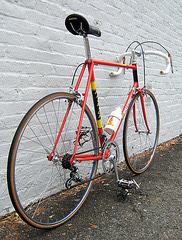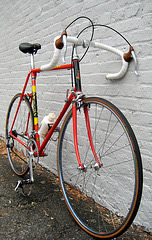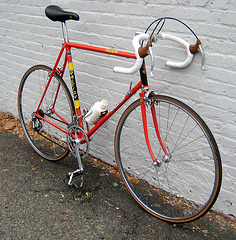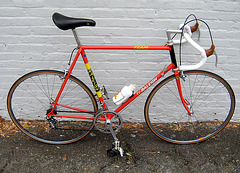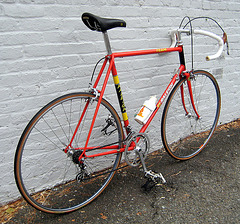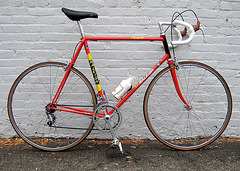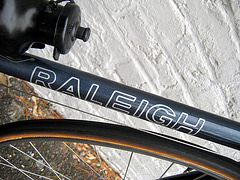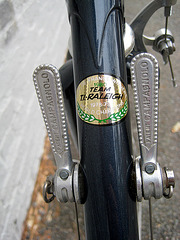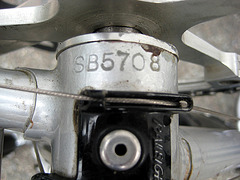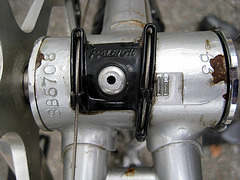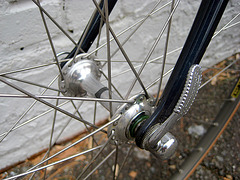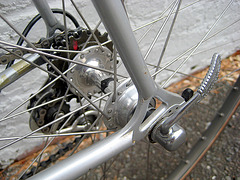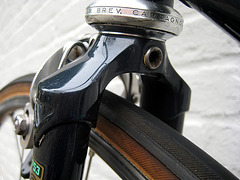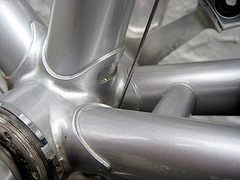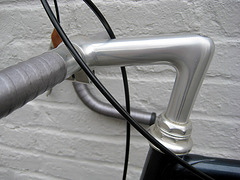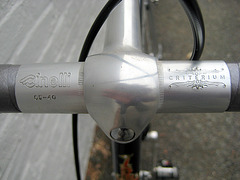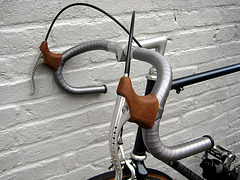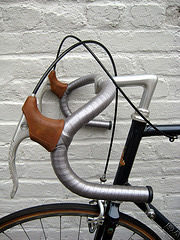Peter Kohler's photos
IMG_4163
| |
|
IMG_4162
| |
|
IMG_4161
| |
|
IMG_4159
| |
|
IMG_4160
| |
|
1980 Raleigh SBDU Team Professional
| |
|
serial no. SB 4074
Where it came from
This machine started life as a 1975 531 tubed Team Pro SB215 purchased on 25 June 1976 in Houston, Texas, for $900. Frame fractured in November 1980 and replaced by Raleigh with a new 753 frame (serial no. 4074) with original components switched over except for the seat pin (a new Super Record 26.8 seat pin was purchased for $35 to fit the 753 seat tube). The original owner paid an additional $240 for the upgrade to the 753 frame. Purchased from the original owner on 3 April 2005. Returned to the road 28 May.
Some history
Headed by Carlton’s Gerald O’Donovan, Raleigh Specialist Bicycle Development Unit, was created in 1974 and housed in its own standalone factory in Ilkeston, Derbyshire, which was once part of the Rolls Royce works. The SB unit is best known for pioneering and proving the new Reynolds 753 lightweight tubing in 1974 although it made Reynolds 531 framesets as well. Initially, almost all 753 production was for the TI Raleigh Team (which was equipped with 753 frames from the 1975 season onwards) and other European teams with each team member of the Raleigh squad getting two or three frames per season. From 1974-77 it bought out most if not all of the 753 tubing from Reynolds (both Raleigh and Reynolds being part of the TI conglomerate of course) making it exclusive to Raleigh. Production increased to the point of offering framesets starting in November 1975. The 753 was offered in track, roadracing and special time trials frames in the famous team livery, midnight blue or champagne. Initially Ilkeston turned out about 25 753 tubed frames a week c. 1977 and produced approximately 9000 framesets in both 531 and 753 for individuals and teams until its closure in 1986.
Formed at the end of 1973 out of the former Carlton Team, TI Raleigh were the last great powerhouse team of the classic era, headed by Peter Post and featured a stable of mainly Dutch and German riders including Gerrie Knetemann, Roy Schuiten, Jan Raas and Bert Oosterbosch, each a world champion. In 1977 the team competed in the Tour de France for the first time with Didi Thurau wearing the Yellow Jersey for 14 days and Henny Kuiper winning overall 2nd Place. The following year, Gerrie Knetemann won the world road championship and in 1979 Jan Raas claimed the championship. The pinnacle was reached in 1980 with Joop Zoetemelk winning the Tour de France, the first and only time it was won on a British-made machine. When the team was wound up at the end of 1983, it had garnered a record number of 958 pro wins in its 10 years.
Frame/Fork
Material: Reynolds 753 double butted
Braze ons: top tube brake cable stops, gear lever bosses, under bottom bracket cable guides, gear cable stop on chainstay, down tube water bottle mountings. "Fishmouth" seat and chain stays ends and oversized caps to the tops of the seat stays.
Drop outs: drilled Campagnolo 1010B short
Finish: original TI Raleigh Team livery. Raleigh Special Built Unit stickers on chainstays and sticker on down tube celebrating Raleigh’s 1980 Tour de France and 1979 World Championship wins.
Size: seat tube 59 cm (c to c), 61 cm (c to t) top tube 58 cm (c to c)
Chain stay length: 41 cm (centre of spindle axle to centre of dropout)
Angles: 74 head and seat
Fork rake: 4.2 cm
Wheelbase: 101 cm
Bottom bracket height: 10.75”
Rear spacing: 128 mm
Lugs: Prugnat 62 and Vagner fork crown
Weight: 19.5 lbs. complete machine
Components
Rims: Mavic Speciale Services des Courses Bleu SSC 32-hole rims (700c x 20mm, 395g)
Hubs: 32-hole Campagnolo Super Record low-flange hubs, 2.0 x 1.5. x 2.0 double butted stainless DT spokes (3x) and Campagnolo Super Record skewers.
Tyres: Tufo Jet Pro 19mm sew ups.
Bottom bracket: RGF with Campagnolo Super Record bb with titanium spindle, English thread thread
Chainset: Campagnolo Super Record Strada 172.5 cranks, 53t x 42t rings
Pedals: Campagnolo Super Record road racing with titanium spindles. Sturmer Archer toeclips and straps
Derailleur: Campagnolo Super Record, pat. 1975
Freewheel: Maillard 700 Course Professionnel dural 13-14-15-16-17-18 t
Chain: Sedis
Brakes: Campagnolo Super Record short reach
Headset: Campagnolo Super Record English thread
Stem & handlebars: Cinelli oval logo 1A 110 mm stem with Cinelli no. 65 “Criterium’ old logo 40 cm handlebars, Ambrosio bike ribbon tape and Velox plugs.
Saddle: Iscaselle Tornado
Seat pin: Campagnolo Super Record twin-bolt
Accessories: Silca Imperio pump and TA TI Raleigh water bottle
1984 Raleigh SBDU Pro Super
| |
|
serial no. SB 5708
Purchased as a frameset on eBay (UK) in October 2008 for £170. Back on the road 6 December
Frame/Fork
Material: Reynolds 753R double butted
Braze ons: top tube brake cable stops for "bare wire" brake cabling, gear lever bosses, under bottom bracket cable guides, gear cable stop on chainstay, chain hanger on driveside seat stay, down tube water bottle mountings and competition number hanger. Shot-in back stays. "Fishmouth" treatment to chainstay and backstay ends.
Bottom bracket: Cinelli Microfusion investment cast
Drop outs: drilled Campagnolo 1010B short
Finish: original anthracite grey fade to silver. Raleigh Special Built Unit stickers on chainstays and sticker on down tube celebrating Raleigh’s 1980 Tour de France and 1978-79 World Championship wins. Raised “paint effect” Raleigh transfers on down tube. TI Raleigh roundel, “Handcrafted in England”, post 1984 pattern Reynolds 753R tubing transfers on seat tube.
Size: seat tube 63 cm (c to t), 61.5 cm (c to c) top tube 58 cm (c to c)
Chain stay length: 41 cm (centre of spindle axle to centre of dropout)
Angles: 74.2˚ head and 72.5˚ seat
Fork rake: 4.2 cm
Wheelbase: 101 cm
Bottom bracket height: 10.¾”
Rear spacing: 126 mm
Lugs: Prugnat 62 bis and Cinelli pattern sloping fork crown
Weight: frame: frame 3.86 lbs fork 1.7 lbs
Weight built up: 19.3 lbs
Serial nos.: SB5708 63 bottom of bb shell, 5708 stamped on steerer tube
Components
Wheels: Mavic GEL-280 anodised rims (700c x 20 mm, 280g) with 36-hole Campagnolo Super Record low-flange hubs, double butted stainless spokes (3x) and Campagnolo Super Record 2nd Generation curved skewers.
Tyres: Tufo Jet Pro sew ups
Bottom bracket: Campagnolo Super Record 2nd Generation bb with solid titanium spindle, English thread
Chainset: Campagnolo Super Record Strada 177.5 cranks (1982 date code), 53t x 45t rings
Pedals: Campagnolo Super Record road racing with titanium spindles. ALE black alloy toe clips and ALE straps
Derailleur: Campagnolo 2nd Generation Super Record, pat. 1984
Freewheel: Everest Nova Dural 12-18t
Chain: SRAM PC-870 nickel-plated
Brakes: Campagnolo 2nd Generation Super Record short reach, recessed Allen bolt fitting
Headset: Campagnolo Super Record English thread
Stem & handlebars: Cinelli 1A 115 mm stem with Cinelli no. 65 Criterium matt anodised 40 cm handlebars, Benotto grey plastic tape and Velox plugs.
Saddle: Brooks Professional, 1984 date code
Seat pin: Campagnolo 2nd Generation Super Record 26.8 mm, single-bolt
Accessories: ALE black alloy bottle cage and REG bottle
RALEIGH SBDU
In 1974 Raleigh recruited Gerald O'Donovan, son of the founder of Carlton Cycles, to establish a specialist workshop capable of frame building and bicycle development to the very highest standards. Modest space was taken in part of the old Rolls-Royce factory at Ilkeston, Derbyshire - a few miles away from Raleigh's main factory in Nottingham. Gerald hand picked the best frame builders from Carlton, and the Unit began producing competition-specific frames to the very highest standards. Gerald was a stickler for quality, and favoured a crisp, plain and elegant syle of frame, with no gimmicks or unnecessary adornment. Only the best components were used, such as Campagnolo ends, Prugnat lugs, Cinelli and RGF BB shells, Vagner and Cinelli crowns. Frames were built for Raleigh and Carlton sponsored domestic teams and riders, as well as Peter Post's famous 'TI Creda' and 'Panasonic' continental pro teams. As such, Raleigh SBDU produced the only British frames to ever win the Tour de France (Joop Zoetemelk, 1980). There were dozens of other notable international wins on SBDU frames. SBDU also carried out specialist research and development work for Raleigh - and built frames for 'punters' to special order. Stock frame models, built by SBDU, were shown in Raleigh's brochures during the early eighties. The Unit worked with Reynolds in developing 'Reynolds 753', the first 'super steel' tubing for bicycles. SBDU also pioneered aerodynamic frames, monocoque designs and composite construction - and built highly developed BMX frames for Raleigh's'Burner' race team. However, it is for elegant and beautifully built steel road-race frames that SBDU will always be remembered. The Unit closed in 1986, a victim of Raleigh's cost-cutting and internal politics. Average output, over the Unit's twelve year existence, was just over 700 frames per year (less than three per working day), making sound, genuine examples of SBDU's work very, very rare today.
RINGERS, REPLICAS AND RUBBISH
Replica 'Specialist Bicycle' chainstay roundel stickers and Raleigh decal sets have been available for some time, and - Raleigh's 'mass-production' lightweight departments at Worksop and Nottingham produced frames in team colours using some similar frame components and design features, concurrent to Ilkeston's activities. Therefore lesser frames are often passed off as SBDU ones. It is also easy, during refinishing, to add a 753 sticker to an SBDU 531 or 531SL frame. The lightweight nature of 531SL, 531 Pro and 753 tubing makes it prone to weakness due to bad rust, accidents or heavy use. A 'tired' frameset in these types of tubing should be avoided - but is easily disguised with new paint. Genuine Ilkeston frames can be identified by frame numbers with no more than four figures (1 to approx 8500), prefixed 'SB' - and by the quality of framebuilding components and workmanship - never matched by Worksop or Nottingham. SBDU is not to be confused with RSP (Raleigh Special Products). RSP came later, was based at Nottingham, and the workmanship of RSP 'Custom Braze' frames of the late eighties is often dreadful. There are no such problems with the genuine example offered here. It is original and undamaged.
REYNOLDS 753
Reynolds had been experimenting with its 531 manganese molybdenum steel alloy to achieve ever thinner gauges for pro and team frames during the early seventies. This resulted in '531SL' which was promoted as being for time-trial and professional use only, due to its relative fragility. Reynolds collaborated with Raleigh's Specialist Bicycle Development Unit to arrive at something more robust but at a similarly low weight. The solution was a refined and heat-treated version of 531. Reynolds named this '753'. The first sets of 753 were supplied exclusively to SBDU, in metric diameters, for use by Raliegh's pro teams and sponsored riders. The earliest metric frames were disguised by carrying standard 531 transfers! It was possible to use 753 for general road racing duties with wall thicknesses as low as 0.3mm, resulting in frame weights of less than 1700g - which was unheard of at the time. Imperial diameters were made available later, and a 'Reynolds 753 Approved Builder' qualification scheme was established prior to builders being supplied. 753 must be 'silver soldered', at a lower tempaerature than regular capiliary bronze-brazing, so as not to spoil the temper of the steel. Silver soldering is an expensive process, and 753 frames, due to the temper of the steel, cannot be re-aligned after building - calling for the utmost care and accuracy in construction. Therefore 753 frames were always very expensive and rather exotic. Reynolds continued production of 753, as the world's premier steel cycle tubing, until replaced by their 'air hardening' 853 in 1995.
(the above courtesy of David Palk, UK, from his eBay listing for the frame)
1984 Raleigh SBDU Pro Super
| |
|
serial no. SB 5708
Purchased as a frameset on eBay (UK) in October 2008 for £170. Back on the road 6 December
Frame/Fork
Material: Reynolds 753R double butted
Braze ons: top tube brake cable stops for "bare wire" brake cabling, gear lever bosses, under bottom bracket cable guides, gear cable stop on chainstay, chain hanger on driveside seat stay, down tube water bottle mountings and competition number hanger. Shot-in back stays. "Fishmouth" treatment to chainstay and backstay ends.
Bottom bracket: Cinelli Microfusion investment cast
Drop outs: drilled Campagnolo 1010B short
Finish: original anthracite grey fade to silver. Raleigh Special Built Unit stickers on chainstays and sticker on down tube celebrating Raleigh’s 1980 Tour de France and 1978-79 World Championship wins. Raised “paint effect” Raleigh transfers on down tube. TI Raleigh roundel, “Handcrafted in England”, post 1984 pattern Reynolds 753R tubing transfers on seat tube.
Size: seat tube 63 cm (c to t), 61.5 cm (c to c) top tube 58 cm (c to c)
Chain stay length: 41 cm (centre of spindle axle to centre of dropout)
Angles: 74.2˚ head and 72.5˚ seat
Fork rake: 4.2 cm
Wheelbase: 101 cm
Bottom bracket height: 10.¾”
Rear spacing: 126 mm
Lugs: Prugnat 62 bis and Cinelli pattern sloping fork crown
Weight: frame: frame 3.86 lbs fork 1.7 lbs
Weight built up: 19.3 lbs
Serial nos.: SB5708 63 bottom of bb shell, 5708 stamped on steerer tube
Components
Wheels: Mavic GEL-280 anodised rims (700c x 20 mm, 280g) with 36-hole Campagnolo Super Record low-flange hubs, double butted stainless spokes (3x) and Campagnolo Super Record 2nd Generation curved skewers.
Tyres: Tufo Jet Pro sew ups
Bottom bracket: Campagnolo Super Record 2nd Generation bb with solid titanium spindle, English thread
Chainset: Campagnolo Super Record Strada 177.5 cranks (1982 date code), 53t x 45t rings
Pedals: Campagnolo Super Record road racing with titanium spindles. ALE black alloy toe clips and ALE straps
Derailleur: Campagnolo 2nd Generation Super Record, pat. 1984
Freewheel: Everest Nova Dural 12-18t
Chain: SRAM PC-870 nickel-plated
Brakes: Campagnolo 2nd Generation Super Record short reach, recessed Allen bolt fitting
Headset: Campagnolo Super Record English thread
Stem & handlebars: Cinelli 1A 115 mm stem with Cinelli no. 65 Criterium matt anodised 40 cm handlebars, Benotto grey plastic tape and Velox plugs.
Saddle: Brooks Professional, 1984 date code
Seat pin: Campagnolo 2nd Generation Super Record 26.8 mm, single-bolt
Accessories: ALE black alloy bottle cage and REG bottle
RALEIGH SBDU
In 1974 Raleigh recruited Gerald O'Donovan, son of the founder of Carlton Cycles, to establish a specialist workshop capable of frame building and bicycle development to the very highest standards. Modest space was taken in part of the old Rolls-Royce factory at Ilkeston, Derbyshire - a few miles away from Raleigh's main factory in Nottingham. Gerald hand picked the best frame builders from Carlton, and the Unit began producing competition-specific frames to the very highest standards. Gerald was a stickler for quality, and favoured a crisp, plain and elegant syle of frame, with no gimmicks or unnecessary adornment. Only the best components were used, such as Campagnolo ends, Prugnat lugs, Cinelli and RGF BB shells, Vagner and Cinelli crowns. Frames were built for Raleigh and Carlton sponsored domestic teams and riders, as well as Peter Post's famous 'TI Creda' and 'Panasonic' continental pro teams. As such, Raleigh SBDU produced the only British frames to ever win the Tour de France (Joop Zoetemelk, 1980). There were dozens of other notable international wins on SBDU frames. SBDU also carried out specialist research and development work for Raleigh - and built frames for 'punters' to special order. Stock frame models, built by SBDU, were shown in Raleigh's brochures during the early eighties. The Unit worked with Reynolds in developing 'Reynolds 753', the first 'super steel' tubing for bicycles. SBDU also pioneered aerodynamic frames, monocoque designs and composite construction - and built highly developed BMX frames for Raleigh's'Burner' race team. However, it is for elegant and beautifully built steel road-race frames that SBDU will always be remembered. The Unit closed in 1986, a victim of Raleigh's cost-cutting and internal politics. Average output, over the Unit's twelve year existence, was just over 700 frames per year (less than three per working day), making sound, genuine examples of SBDU's work very, very rare today.
RINGERS, REPLICAS AND RUBBISH
Replica 'Specialist Bicycle' chainstay roundel stickers and Raleigh decal sets have been available for some time, and - Raleigh's 'mass-production' lightweight departments at Worksop and Nottingham produced frames in team colours using some similar frame components and design features, concurrent to Ilkeston's activities. Therefore lesser frames are often passed off as SBDU ones. It is also easy, during refinishing, to add a 753 sticker to an SBDU 531 or 531SL frame. The lightweight nature of 531SL, 531 Pro and 753 tubing makes it prone to weakness due to bad rust, accidents or heavy use. A 'tired' frameset in these types of tubing should be avoided - but is easily disguised with new paint. Genuine Ilkeston frames can be identified by frame numbers with no more than four figures (1 to approx 8500), prefixed 'SB' - and by the quality of framebuilding components and workmanship - never matched by Worksop or Nottingham. SBDU is not to be confused with RSP (Raleigh Special Products). RSP came later, was based at Nottingham, and the workmanship of RSP 'Custom Braze' frames of the late eighties is often dreadful. There are no such problems with the genuine example offered here. It is original and undamaged.
REYNOLDS 753
Reynolds had been experimenting with its 531 manganese molybdenum steel alloy to achieve ever thinner gauges for pro and team frames during the early seventies. This resulted in '531SL' which was promoted as being for time-trial and professional use only, due to its relative fragility. Reynolds collaborated with Raleigh's Specialist Bicycle Development Unit to arrive at something more robust but at a similarly low weight. The solution was a refined and heat-treated version of 531. Reynolds named this '753'. The first sets of 753 were supplied exclusively to SBDU, in metric diameters, for use by Raliegh's pro teams and sponsored riders. The earliest metric frames were disguised by carrying standard 531 transfers! It was possible to use 753 for general road racing duties with wall thicknesses as low as 0.3mm, resulting in frame weights of less than 1700g - which was unheard of at the time. Imperial diameters were made available later, and a 'Reynolds 753 Approved Builder' qualification scheme was established prior to builders being supplied. 753 must be 'silver soldered', at a lower tempaerature than regular capiliary bronze-brazing, so as not to spoil the temper of the steel. Silver soldering is an expensive process, and 753 frames, due to the temper of the steel, cannot be re-aligned after building - calling for the utmost care and accuracy in construction. Therefore 753 frames were always very expensive and rather exotic. Reynolds continued production of 753, as the world's premier steel cycle tubing, until replaced by their 'air hardening' 853 in 1995.
(the above courtesy of David Palk, UK, from his eBay listing for the frame)
1984 Raleigh SBDU Pro Super
| |
|
serial no. SB 5708
Purchased as a frameset on eBay (UK) in October 2008 for £170. Back on the road 6 December
Frame/Fork
Material: Reynolds 753R double butted
Braze ons: top tube brake cable stops for "bare wire" brake cabling, gear lever bosses, under bottom bracket cable guides, gear cable stop on chainstay, chain hanger on driveside seat stay, down tube water bottle mountings and competition number hanger. Shot-in back stays. "Fishmouth" treatment to chainstay and backstay ends.
Bottom bracket: Cinelli Microfusion investment cast
Drop outs: drilled Campagnolo 1010B short
Finish: original anthracite grey fade to silver. Raleigh Special Built Unit stickers on chainstays and sticker on down tube celebrating Raleigh’s 1980 Tour de France and 1978-79 World Championship wins. Raised “paint effect” Raleigh transfers on down tube. TI Raleigh roundel, “Handcrafted in England”, post 1984 pattern Reynolds 753R tubing transfers on seat tube.
Size: seat tube 63 cm (c to t), 61.5 cm (c to c) top tube 58 cm (c to c)
Chain stay length: 41 cm (centre of spindle axle to centre of dropout)
Angles: 74.2˚ head and 72.5˚ seat
Fork rake: 4.2 cm
Wheelbase: 101 cm
Bottom bracket height: 10.¾”
Rear spacing: 126 mm
Lugs: Prugnat 62 bis and Cinelli pattern sloping fork crown
Weight: frame: frame 3.86 lbs fork 1.7 lbs
Weight built up: 19.3 lbs
Serial nos.: SB5708 63 bottom of bb shell, 5708 stamped on steerer tube
Components
Wheels: Mavic GEL-280 anodised rims (700c x 20 mm, 280g) with 36-hole Campagnolo Super Record low-flange hubs, double butted stainless spokes (3x) and Campagnolo Super Record 2nd Generation curved skewers.
Tyres: Tufo Jet Pro sew ups
Bottom bracket: Campagnolo Super Record 2nd Generation bb with solid titanium spindle, English thread
Chainset: Campagnolo Super Record Strada 177.5 cranks (1982 date code), 53t x 45t rings
Pedals: Campagnolo Super Record road racing with titanium spindles. ALE black alloy toe clips and ALE straps
Derailleur: Campagnolo 2nd Generation Super Record, pat. 1984
Freewheel: Everest Nova Dural 12-18t
Chain: SRAM PC-870 nickel-plated
Brakes: Campagnolo 2nd Generation Super Record short reach, recessed Allen bolt fitting
Headset: Campagnolo Super Record English thread
Stem & handlebars: Cinelli 1A 115 mm stem with Cinelli no. 65 Criterium matt anodised 40 cm handlebars, Benotto grey plastic tape and Velox plugs.
Saddle: Brooks Professional, 1984 date code
Seat pin: Campagnolo 2nd Generation Super Record 26.8 mm, single-bolt
Accessories: ALE black alloy bottle cage and REG bottle
RALEIGH SBDU
In 1974 Raleigh recruited Gerald O'Donovan, son of the founder of Carlton Cycles, to establish a specialist workshop capable of frame building and bicycle development to the very highest standards. Modest space was taken in part of the old Rolls-Royce factory at Ilkeston, Derbyshire - a few miles away from Raleigh's main factory in Nottingham. Gerald hand picked the best frame builders from Carlton, and the Unit began producing competition-specific frames to the very highest standards. Gerald was a stickler for quality, and favoured a crisp, plain and elegant syle of frame, with no gimmicks or unnecessary adornment. Only the best components were used, such as Campagnolo ends, Prugnat lugs, Cinelli and RGF BB shells, Vagner and Cinelli crowns. Frames were built for Raleigh and Carlton sponsored domestic teams and riders, as well as Peter Post's famous 'TI Creda' and 'Panasonic' continental pro teams. As such, Raleigh SBDU produced the only British frames to ever win the Tour de France (Joop Zoetemelk, 1980). There were dozens of other notable international wins on SBDU frames. SBDU also carried out specialist research and development work for Raleigh - and built frames for 'punters' to special order. Stock frame models, built by SBDU, were shown in Raleigh's brochures during the early eighties. The Unit worked with Reynolds in developing 'Reynolds 753', the first 'super steel' tubing for bicycles. SBDU also pioneered aerodynamic frames, monocoque designs and composite construction - and built highly developed BMX frames for Raleigh's'Burner' race team. However, it is for elegant and beautifully built steel road-race frames that SBDU will always be remembered. The Unit closed in 1986, a victim of Raleigh's cost-cutting and internal politics. Average output, over the Unit's twelve year existence, was just over 700 frames per year (less than three per working day), making sound, genuine examples of SBDU's work very, very rare today.
RINGERS, REPLICAS AND RUBBISH
Replica 'Specialist Bicycle' chainstay roundel stickers and Raleigh decal sets have been available for some time, and - Raleigh's 'mass-production' lightweight departments at Worksop and Nottingham produced frames in team colours using some similar frame components and design features, concurrent to Ilkeston's activities. Therefore lesser frames are often passed off as SBDU ones. It is also easy, during refinishing, to add a 753 sticker to an SBDU 531 or 531SL frame. The lightweight nature of 531SL, 531 Pro and 753 tubing makes it prone to weakness due to bad rust, accidents or heavy use. A 'tired' frameset in these types of tubing should be avoided - but is easily disguised with new paint. Genuine Ilkeston frames can be identified by frame numbers with no more than four figures (1 to approx 8500), prefixed 'SB' - and by the quality of framebuilding components and workmanship - never matched by Worksop or Nottingham. SBDU is not to be confused with RSP (Raleigh Special Products). RSP came later, was based at Nottingham, and the workmanship of RSP 'Custom Braze' frames of the late eighties is often dreadful. There are no such problems with the genuine example offered here. It is original and undamaged.
REYNOLDS 753
Reynolds had been experimenting with its 531 manganese molybdenum steel alloy to achieve ever thinner gauges for pro and team frames during the early seventies. This resulted in '531SL' which was promoted as being for time-trial and professional use only, due to its relative fragility. Reynolds collaborated with Raleigh's Specialist Bicycle Development Unit to arrive at something more robust but at a similarly low weight. The solution was a refined and heat-treated version of 531. Reynolds named this '753'. The first sets of 753 were supplied exclusively to SBDU, in metric diameters, for use by Raliegh's pro teams and sponsored riders. The earliest metric frames were disguised by carrying standard 531 transfers! It was possible to use 753 for general road racing duties with wall thicknesses as low as 0.3mm, resulting in frame weights of less than 1700g - which was unheard of at the time. Imperial diameters were made available later, and a 'Reynolds 753 Approved Builder' qualification scheme was established prior to builders being supplied. 753 must be 'silver soldered', at a lower tempaerature than regular capiliary bronze-brazing, so as not to spoil the temper of the steel. Silver soldering is an expensive process, and 753 frames, due to the temper of the steel, cannot be re-aligned after building - calling for the utmost care and accuracy in construction. Therefore 753 frames were always very expensive and rather exotic. Reynolds continued production of 753, as the world's premier steel cycle tubing, until replaced by their 'air hardening' 853 in 1995.
(the above courtesy of David Palk, UK, from his eBay listing for the frame)
1984 Raleigh SBDU Pro Super
| |
|
serial no. SB 5708
Purchased as a frameset on eBay (UK) in October 2008 for £170. Back on the road 6 December
Frame/Fork
Material: Reynolds 753R double butted
Braze ons: top tube brake cable stops for "bare wire" brake cabling, gear lever bosses, under bottom bracket cable guides, gear cable stop on chainstay, chain hanger on driveside seat stay, down tube water bottle mountings and competition number hanger. Shot-in back stays. "Fishmouth" treatment to chainstay and backstay ends.
Bottom bracket: Cinelli Microfusion investment cast
Drop outs: drilled Campagnolo 1010B short
Finish: original anthracite grey fade to silver. Raleigh Special Built Unit stickers on chainstays and sticker on down tube celebrating Raleigh’s 1980 Tour de France and 1978-79 World Championship wins. Raised “paint effect” Raleigh transfers on down tube. TI Raleigh roundel, “Handcrafted in England”, post 1984 pattern Reynolds 753R tubing transfers on seat tube.
Size: seat tube 63 cm (c to t), 61.5 cm (c to c) top tube 58 cm (c to c)
Chain stay length: 41 cm (centre of spindle axle to centre of dropout)
Angles: 74.2˚ head and 72.5˚ seat
Fork rake: 4.2 cm
Wheelbase: 101 cm
Bottom bracket height: 10.¾”
Rear spacing: 126 mm
Lugs: Prugnat 62 bis and Cinelli pattern sloping fork crown
Weight: frame: frame 3.86 lbs fork 1.7 lbs
Weight built up: 19.3 lbs
Serial nos.: SB5708 63 bottom of bb shell, 5708 stamped on steerer tube
Components
Wheels: Mavic GEL-280 anodised rims (700c x 20 mm, 280g) with 36-hole Campagnolo Super Record low-flange hubs, double butted stainless spokes (3x) and Campagnolo Super Record 2nd Generation curved skewers.
Tyres: Tufo Jet Pro sew ups
Bottom bracket: Campagnolo Super Record 2nd Generation bb with solid titanium spindle, English thread
Chainset: Campagnolo Super Record Strada 177.5 cranks (1982 date code), 53t x 45t rings
Pedals: Campagnolo Super Record road racing with titanium spindles. ALE black alloy toe clips and ALE straps
Derailleur: Campagnolo 2nd Generation Super Record, pat. 1984
Freewheel: Everest Nova Dural 12-18t
Chain: SRAM PC-870 nickel-plated
Brakes: Campagnolo 2nd Generation Super Record short reach, recessed Allen bolt fitting
Headset: Campagnolo Super Record English thread
Stem & handlebars: Cinelli 1A 115 mm stem with Cinelli no. 65 Criterium matt anodised 40 cm handlebars, Benotto grey plastic tape and Velox plugs.
Saddle: Brooks Professional, 1984 date code
Seat pin: Campagnolo 2nd Generation Super Record 26.8 mm, single-bolt
Accessories: ALE black alloy bottle cage and REG bottle
RALEIGH SBDU
In 1974 Raleigh recruited Gerald O'Donovan, son of the founder of Carlton Cycles, to establish a specialist workshop capable of frame building and bicycle development to the very highest standards. Modest space was taken in part of the old Rolls-Royce factory at Ilkeston, Derbyshire - a few miles away from Raleigh's main factory in Nottingham. Gerald hand picked the best frame builders from Carlton, and the Unit began producing competition-specific frames to the very highest standards. Gerald was a stickler for quality, and favoured a crisp, plain and elegant syle of frame, with no gimmicks or unnecessary adornment. Only the best components were used, such as Campagnolo ends, Prugnat lugs, Cinelli and RGF BB shells, Vagner and Cinelli crowns. Frames were built for Raleigh and Carlton sponsored domestic teams and riders, as well as Peter Post's famous 'TI Creda' and 'Panasonic' continental pro teams. As such, Raleigh SBDU produced the only British frames to ever win the Tour de France (Joop Zoetemelk, 1980). There were dozens of other notable international wins on SBDU frames. SBDU also carried out specialist research and development work for Raleigh - and built frames for 'punters' to special order. Stock frame models, built by SBDU, were shown in Raleigh's brochures during the early eighties. The Unit worked with Reynolds in developing 'Reynolds 753', the first 'super steel' tubing for bicycles. SBDU also pioneered aerodynamic frames, monocoque designs and composite construction - and built highly developed BMX frames for Raleigh's'Burner' race team. However, it is for elegant and beautifully built steel road-race frames that SBDU will always be remembered. The Unit closed in 1986, a victim of Raleigh's cost-cutting and internal politics. Average output, over the Unit's twelve year existence, was just over 700 frames per year (less than three per working day), making sound, genuine examples of SBDU's work very, very rare today.
RINGERS, REPLICAS AND RUBBISH
Replica 'Specialist Bicycle' chainstay roundel stickers and Raleigh decal sets have been available for some time, and - Raleigh's 'mass-production' lightweight departments at Worksop and Nottingham produced frames in team colours using some similar frame components and design features, concurrent to Ilkeston's activities. Therefore lesser frames are often passed off as SBDU ones. It is also easy, during refinishing, to add a 753 sticker to an SBDU 531 or 531SL frame. The lightweight nature of 531SL, 531 Pro and 753 tubing makes it prone to weakness due to bad rust, accidents or heavy use. A 'tired' frameset in these types of tubing should be avoided - but is easily disguised with new paint. Genuine Ilkeston frames can be identified by frame numbers with no more than four figures (1 to approx 8500), prefixed 'SB' - and by the quality of framebuilding components and workmanship - never matched by Worksop or Nottingham. SBDU is not to be confused with RSP (Raleigh Special Products). RSP came later, was based at Nottingham, and the workmanship of RSP 'Custom Braze' frames of the late eighties is often dreadful. There are no such problems with the genuine example offered here. It is original and undamaged.
REYNOLDS 753
Reynolds had been experimenting with its 531 manganese molybdenum steel alloy to achieve ever thinner gauges for pro and team frames during the early seventies. This resulted in '531SL' which was promoted as being for time-trial and professional use only, due to its relative fragility. Reynolds collaborated with Raleigh's Specialist Bicycle Development Unit to arrive at something more robust but at a similarly low weight. The solution was a refined and heat-treated version of 531. Reynolds named this '753'. The first sets of 753 were supplied exclusively to SBDU, in metric diameters, for use by Raliegh's pro teams and sponsored riders. The earliest metric frames were disguised by carrying standard 531 transfers! It was possible to use 753 for general road racing duties with wall thicknesses as low as 0.3mm, resulting in frame weights of less than 1700g - which was unheard of at the time. Imperial diameters were made available later, and a 'Reynolds 753 Approved Builder' qualification scheme was established prior to builders being supplied. 753 must be 'silver soldered', at a lower tempaerature than regular capiliary bronze-brazing, so as not to spoil the temper of the steel. Silver soldering is an expensive process, and 753 frames, due to the temper of the steel, cannot be re-aligned after building - calling for the utmost care and accuracy in construction. Therefore 753 frames were always very expensive and rather exotic. Reynolds continued production of 753, as the world's premier steel cycle tubing, until replaced by their 'air hardening' 853 in 1995.
(the above courtesy of David Palk, UK, from his eBay listing for the frame)
1984 Raleigh SBDU Pro Super
| |
|
serial no. SB 5708
Purchased as a frameset on eBay (UK) in October 2008 for £170. Back on the road 6 December
Frame/Fork
Material: Reynolds 753R double butted
Braze ons: top tube brake cable stops for "bare wire" brake cabling, gear lever bosses, under bottom bracket cable guides, gear cable stop on chainstay, chain hanger on driveside seat stay, down tube water bottle mountings and competition number hanger. Shot-in back stays. "Fishmouth" treatment to chainstay and backstay ends.
Bottom bracket: Cinelli Microfusion investment cast
Drop outs: drilled Campagnolo 1010B short
Finish: original anthracite grey fade to silver. Raleigh Special Built Unit stickers on chainstays and sticker on down tube celebrating Raleigh’s 1980 Tour de France and 1978-79 World Championship wins. Raised “paint effect” Raleigh transfers on down tube. TI Raleigh roundel, “Handcrafted in England”, post 1984 pattern Reynolds 753R tubing transfers on seat tube.
Size: seat tube 63 cm (c to t), 61.5 cm (c to c) top tube 58 cm (c to c)
Chain stay length: 41 cm (centre of spindle axle to centre of dropout)
Angles: 74.2˚ head and 72.5˚ seat
Fork rake: 4.2 cm
Wheelbase: 101 cm
Bottom bracket height: 10.¾”
Rear spacing: 126 mm
Lugs: Prugnat 62 bis and Cinelli pattern sloping fork crown
Weight: frame: frame 3.86 lbs fork 1.7 lbs
Weight built up: 19.3 lbs
Serial nos.: SB5708 63 bottom of bb shell, 5708 stamped on steerer tube
Components
Wheels: Mavic GEL-280 anodised rims (700c x 20 mm, 280g) with 36-hole Campagnolo Super Record low-flange hubs, double butted stainless spokes (3x) and Campagnolo Super Record 2nd Generation curved skewers.
Tyres: Tufo Jet Pro sew ups
Bottom bracket: Campagnolo Super Record 2nd Generation bb with solid titanium spindle, English thread
Chainset: Campagnolo Super Record Strada 177.5 cranks (1982 date code), 53t x 45t rings
Pedals: Campagnolo Super Record road racing with titanium spindles. ALE black alloy toe clips and ALE straps
Derailleur: Campagnolo 2nd Generation Super Record, pat. 1984
Freewheel: Everest Nova Dural 12-18t
Chain: SRAM PC-870 nickel-plated
Brakes: Campagnolo 2nd Generation Super Record short reach, recessed Allen bolt fitting
Headset: Campagnolo Super Record English thread
Stem & handlebars: Cinelli 1A 115 mm stem with Cinelli no. 65 Criterium matt anodised 40 cm handlebars, Benotto grey plastic tape and Velox plugs.
Saddle: Brooks Professional, 1984 date code
Seat pin: Campagnolo 2nd Generation Super Record 26.8 mm, single-bolt
Accessories: ALE black alloy bottle cage and REG bottle
RALEIGH SBDU
In 1974 Raleigh recruited Gerald O'Donovan, son of the founder of Carlton Cycles, to establish a specialist workshop capable of frame building and bicycle development to the very highest standards. Modest space was taken in part of the old Rolls-Royce factory at Ilkeston, Derbyshire - a few miles away from Raleigh's main factory in Nottingham. Gerald hand picked the best frame builders from Carlton, and the Unit began producing competition-specific frames to the very highest standards. Gerald was a stickler for quality, and favoured a crisp, plain and elegant syle of frame, with no gimmicks or unnecessary adornment. Only the best components were used, such as Campagnolo ends, Prugnat lugs, Cinelli and RGF BB shells, Vagner and Cinelli crowns. Frames were built for Raleigh and Carlton sponsored domestic teams and riders, as well as Peter Post's famous 'TI Creda' and 'Panasonic' continental pro teams. As such, Raleigh SBDU produced the only British frames to ever win the Tour de France (Joop Zoetemelk, 1980). There were dozens of other notable international wins on SBDU frames. SBDU also carried out specialist research and development work for Raleigh - and built frames for 'punters' to special order. Stock frame models, built by SBDU, were shown in Raleigh's brochures during the early eighties. The Unit worked with Reynolds in developing 'Reynolds 753', the first 'super steel' tubing for bicycles. SBDU also pioneered aerodynamic frames, monocoque designs and composite construction - and built highly developed BMX frames for Raleigh's'Burner' race team. However, it is for elegant and beautifully built steel road-race frames that SBDU will always be remembered. The Unit closed in 1986, a victim of Raleigh's cost-cutting and internal politics. Average output, over the Unit's twelve year existence, was just over 700 frames per year (less than three per working day), making sound, genuine examples of SBDU's work very, very rare today.
RINGERS, REPLICAS AND RUBBISH
Replica 'Specialist Bicycle' chainstay roundel stickers and Raleigh decal sets have been available for some time, and - Raleigh's 'mass-production' lightweight departments at Worksop and Nottingham produced frames in team colours using some similar frame components and design features, concurrent to Ilkeston's activities. Therefore lesser frames are often passed off as SBDU ones. It is also easy, during refinishing, to add a 753 sticker to an SBDU 531 or 531SL frame. The lightweight nature of 531SL, 531 Pro and 753 tubing makes it prone to weakness due to bad rust, accidents or heavy use. A 'tired' frameset in these types of tubing should be avoided - but is easily disguised with new paint. Genuine Ilkeston frames can be identified by frame numbers with no more than four figures (1 to approx 8500), prefixed 'SB' - and by the quality of framebuilding components and workmanship - never matched by Worksop or Nottingham. SBDU is not to be confused with RSP (Raleigh Special Products). RSP came later, was based at Nottingham, and the workmanship of RSP 'Custom Braze' frames of the late eighties is often dreadful. There are no such problems with the genuine example offered here. It is original and undamaged.
REYNOLDS 753
Reynolds had been experimenting with its 531 manganese molybdenum steel alloy to achieve ever thinner gauges for pro and team frames during the early seventies. This resulted in '531SL' which was promoted as being for time-trial and professional use only, due to its relative fragility. Reynolds collaborated with Raleigh's Specialist Bicycle Development Unit to arrive at something more robust but at a similarly low weight. The solution was a refined and heat-treated version of 531. Reynolds named this '753'. The first sets of 753 were supplied exclusively to SBDU, in metric diameters, for use by Raliegh's pro teams and sponsored riders. The earliest metric frames were disguised by carrying standard 531 transfers! It was possible to use 753 for general road racing duties with wall thicknesses as low as 0.3mm, resulting in frame weights of less than 1700g - which was unheard of at the time. Imperial diameters were made available later, and a 'Reynolds 753 Approved Builder' qualification scheme was established prior to builders being supplied. 753 must be 'silver soldered', at a lower tempaerature than regular capiliary bronze-brazing, so as not to spoil the temper of the steel. Silver soldering is an expensive process, and 753 frames, due to the temper of the steel, cannot be re-aligned after building - calling for the utmost care and accuracy in construction. Therefore 753 frames were always very expensive and rather exotic. Reynolds continued production of 753, as the world's premier steel cycle tubing, until replaced by their 'air hardening' 853 in 1995.
(the above courtesy of David Palk, UK, from his eBay listing for the frame)
1984 Raleigh SBDU Pro Super
| |
|
serial no. SB 5708
Purchased as a frameset on eBay (UK) in October 2008 for £170. Back on the road 6 December
Frame/Fork
Material: Reynolds 753R double butted
Braze ons: top tube brake cable stops for "bare wire" brake cabling, gear lever bosses, under bottom bracket cable guides, gear cable stop on chainstay, chain hanger on driveside seat stay, down tube water bottle mountings and competition number hanger. Shot-in back stays. "Fishmouth" treatment to chainstay and backstay ends.
Bottom bracket: Cinelli Microfusion investment cast
Drop outs: drilled Campagnolo 1010B short
Finish: original anthracite grey fade to silver. Raleigh Special Built Unit stickers on chainstays and sticker on down tube celebrating Raleigh’s 1980 Tour de France and 1978-79 World Championship wins. Raised “paint effect” Raleigh transfers on down tube. TI Raleigh roundel, “Handcrafted in England”, post 1984 pattern Reynolds 753R tubing transfers on seat tube.
Size: seat tube 63 cm (c to t), 61.5 cm (c to c) top tube 58 cm (c to c)
Chain stay length: 41 cm (centre of spindle axle to centre of dropout)
Angles: 74.2˚ head and 72.5˚ seat
Fork rake: 4.2 cm
Wheelbase: 101 cm
Bottom bracket height: 10.¾”
Rear spacing: 126 mm
Lugs: Prugnat 62 bis and Cinelli pattern sloping fork crown
Weight: frame: frame 3.86 lbs fork 1.7 lbs
Weight built up: 19.3 lbs
Serial nos.: SB5708 63 bottom of bb shell, 5708 stamped on steerer tube
Components
Wheels: Mavic GEL-280 anodised rims (700c x 20 mm, 280g) with 36-hole Campagnolo Super Record low-flange hubs, double butted stainless spokes (3x) and Campagnolo Super Record 2nd Generation curved skewers.
Tyres: Tufo Jet Pro sew ups
Bottom bracket: Campagnolo Super Record 2nd Generation bb with solid titanium spindle, English thread
Chainset: Campagnolo Super Record Strada 177.5 cranks (1982 date code), 53t x 45t rings
Pedals: Campagnolo Super Record road racing with titanium spindles. ALE black alloy toe clips and ALE straps
Derailleur: Campagnolo 2nd Generation Super Record, pat. 1984
Freewheel: Everest Nova Dural 12-18t
Chain: SRAM PC-870 nickel-plated
Brakes: Campagnolo 2nd Generation Super Record short reach, recessed Allen bolt fitting
Headset: Campagnolo Super Record English thread
Stem & handlebars: Cinelli 1A 115 mm stem with Cinelli no. 65 Criterium matt anodised 40 cm handlebars, Benotto grey plastic tape and Velox plugs.
Saddle: Brooks Professional, 1984 date code
Seat pin: Campagnolo 2nd Generation Super Record 26.8 mm, single-bolt
Accessories: ALE black alloy bottle cage and REG bottle
RALEIGH SBDU
In 1974 Raleigh recruited Gerald O'Donovan, son of the founder of Carlton Cycles, to establish a specialist workshop capable of frame building and bicycle development to the very highest standards. Modest space was taken in part of the old Rolls-Royce factory at Ilkeston, Derbyshire - a few miles away from Raleigh's main factory in Nottingham. Gerald hand picked the best frame builders from Carlton, and the Unit began producing competition-specific frames to the very highest standards. Gerald was a stickler for quality, and favoured a crisp, plain and elegant syle of frame, with no gimmicks or unnecessary adornment. Only the best components were used, such as Campagnolo ends, Prugnat lugs, Cinelli and RGF BB shells, Vagner and Cinelli crowns. Frames were built for Raleigh and Carlton sponsored domestic teams and riders, as well as Peter Post's famous 'TI Creda' and 'Panasonic' continental pro teams. As such, Raleigh SBDU produced the only British frames to ever win the Tour de France (Joop Zoetemelk, 1980). There were dozens of other notable international wins on SBDU frames. SBDU also carried out specialist research and development work for Raleigh - and built frames for 'punters' to special order. Stock frame models, built by SBDU, were shown in Raleigh's brochures during the early eighties. The Unit worked with Reynolds in developing 'Reynolds 753', the first 'super steel' tubing for bicycles. SBDU also pioneered aerodynamic frames, monocoque designs and composite construction - and built highly developed BMX frames for Raleigh's'Burner' race team. However, it is for elegant and beautifully built steel road-race frames that SBDU will always be remembered. The Unit closed in 1986, a victim of Raleigh's cost-cutting and internal politics. Average output, over the Unit's twelve year existence, was just over 700 frames per year (less than three per working day), making sound, genuine examples of SBDU's work very, very rare today.
RINGERS, REPLICAS AND RUBBISH
Replica 'Specialist Bicycle' chainstay roundel stickers and Raleigh decal sets have been available for some time, and - Raleigh's 'mass-production' lightweight departments at Worksop and Nottingham produced frames in team colours using some similar frame components and design features, concurrent to Ilkeston's activities. Therefore lesser frames are often passed off as SBDU ones. It is also easy, during refinishing, to add a 753 sticker to an SBDU 531 or 531SL frame. The lightweight nature of 531SL, 531 Pro and 753 tubing makes it prone to weakness due to bad rust, accidents or heavy use. A 'tired' frameset in these types of tubing should be avoided - but is easily disguised with new paint. Genuine Ilkeston frames can be identified by frame numbers with no more than four figures (1 to approx 8500), prefixed 'SB' - and by the quality of framebuilding components and workmanship - never matched by Worksop or Nottingham. SBDU is not to be confused with RSP (Raleigh Special Products). RSP came later, was based at Nottingham, and the workmanship of RSP 'Custom Braze' frames of the late eighties is often dreadful. There are no such problems with the genuine example offered here. It is original and undamaged.
REYNOLDS 753
Reynolds had been experimenting with its 531 manganese molybdenum steel alloy to achieve ever thinner gauges for pro and team frames during the early seventies. This resulted in '531SL' which was promoted as being for time-trial and professional use only, due to its relative fragility. Reynolds collaborated with Raleigh's Specialist Bicycle Development Unit to arrive at something more robust but at a similarly low weight. The solution was a refined and heat-treated version of 531. Reynolds named this '753'. The first sets of 753 were supplied exclusively to SBDU, in metric diameters, for use by Raliegh's pro teams and sponsored riders. The earliest metric frames were disguised by carrying standard 531 transfers! It was possible to use 753 for general road racing duties with wall thicknesses as low as 0.3mm, resulting in frame weights of less than 1700g - which was unheard of at the time. Imperial diameters were made available later, and a 'Reynolds 753 Approved Builder' qualification scheme was established prior to builders being supplied. 753 must be 'silver soldered', at a lower tempaerature than regular capiliary bronze-brazing, so as not to spoil the temper of the steel. Silver soldering is an expensive process, and 753 frames, due to the temper of the steel, cannot be re-aligned after building - calling for the utmost care and accuracy in construction. Therefore 753 frames were always very expensive and rather exotic. Reynolds continued production of 753, as the world's premier steel cycle tubing, until replaced by their 'air hardening' 853 in 1995.
(the above courtesy of David Palk, UK, from his eBay listing for the frame)
1984 Raleigh SBDU Pro Super
| |
|
serial no. SB 5708
Purchased as a frameset on eBay (UK) in October 2008 for £170. Back on the road 6 December
Frame/Fork
Material: Reynolds 753R double butted
Braze ons: top tube brake cable stops for "bare wire" brake cabling, gear lever bosses, under bottom bracket cable guides, gear cable stop on chainstay, chain hanger on driveside seat stay, down tube water bottle mountings and competition number hanger. Shot-in back stays. "Fishmouth" treatment to chainstay and backstay ends.
Bottom bracket: Cinelli Microfusion investment cast
Drop outs: drilled Campagnolo 1010B short
Finish: original anthracite grey fade to silver. Raleigh Special Built Unit stickers on chainstays and sticker on down tube celebrating Raleigh’s 1980 Tour de France and 1978-79 World Championship wins. Raised “paint effect” Raleigh transfers on down tube. TI Raleigh roundel, “Handcrafted in England”, post 1984 pattern Reynolds 753R tubing transfers on seat tube.
Size: seat tube 63 cm (c to t), 61.5 cm (c to c) top tube 58 cm (c to c)
Chain stay length: 41 cm (centre of spindle axle to centre of dropout)
Angles: 74.2˚ head and 72.5˚ seat
Fork rake: 4.2 cm
Wheelbase: 101 cm
Bottom bracket height: 10.¾”
Rear spacing: 126 mm
Lugs: Prugnat 62 bis and Cinelli pattern sloping fork crown
Weight: frame: frame 3.86 lbs fork 1.7 lbs
Weight built up: 19.3 lbs
Serial nos.: SB5708 63 bottom of bb shell, 5708 stamped on steerer tube
Components
Wheels: Mavic GEL-280 anodised rims (700c x 20 mm, 280g) with 36-hole Campagnolo Super Record low-flange hubs, double butted stainless spokes (3x) and Campagnolo Super Record 2nd Generation curved skewers.
Tyres: Tufo Jet Pro sew ups
Bottom bracket: Campagnolo Super Record 2nd Generation bb with solid titanium spindle, English thread
Chainset: Campagnolo Super Record Strada 177.5 cranks (1982 date code), 53t x 45t rings
Pedals: Campagnolo Super Record road racing with titanium spindles. ALE black alloy toe clips and ALE straps
Derailleur: Campagnolo 2nd Generation Super Record, pat. 1984
Freewheel: Everest Nova Dural 12-18t
Chain: SRAM PC-870 nickel-plated
Brakes: Campagnolo 2nd Generation Super Record short reach, recessed Allen bolt fitting
Headset: Campagnolo Super Record English thread
Stem & handlebars: Cinelli 1A 115 mm stem with Cinelli no. 65 Criterium matt anodised 40 cm handlebars, Benotto grey plastic tape and Velox plugs.
Saddle: Brooks Professional, 1984 date code
Seat pin: Campagnolo 2nd Generation Super Record 26.8 mm, single-bolt
Accessories: ALE black alloy bottle cage and REG bottle
RALEIGH SBDU
In 1974 Raleigh recruited Gerald O'Donovan, son of the founder of Carlton Cycles, to establish a specialist workshop capable of frame building and bicycle development to the very highest standards. Modest space was taken in part of the old Rolls-Royce factory at Ilkeston, Derbyshire - a few miles away from Raleigh's main factory in Nottingham. Gerald hand picked the best frame builders from Carlton, and the Unit began producing competition-specific frames to the very highest standards. Gerald was a stickler for quality, and favoured a crisp, plain and elegant syle of frame, with no gimmicks or unnecessary adornment. Only the best components were used, such as Campagnolo ends, Prugnat lugs, Cinelli and RGF BB shells, Vagner and Cinelli crowns. Frames were built for Raleigh and Carlton sponsored domestic teams and riders, as well as Peter Post's famous 'TI Creda' and 'Panasonic' continental pro teams. As such, Raleigh SBDU produced the only British frames to ever win the Tour de France (Joop Zoetemelk, 1980). There were dozens of other notable international wins on SBDU frames. SBDU also carried out specialist research and development work for Raleigh - and built frames for 'punters' to special order. Stock frame models, built by SBDU, were shown in Raleigh's brochures during the early eighties. The Unit worked with Reynolds in developing 'Reynolds 753', the first 'super steel' tubing for bicycles. SBDU also pioneered aerodynamic frames, monocoque designs and composite construction - and built highly developed BMX frames for Raleigh's'Burner' race team. However, it is for elegant and beautifully built steel road-race frames that SBDU will always be remembered. The Unit closed in 1986, a victim of Raleigh's cost-cutting and internal politics. Average output, over the Unit's twelve year existence, was just over 700 frames per year (less than three per working day), making sound, genuine examples of SBDU's work very, very rare today.
RINGERS, REPLICAS AND RUBBISH
Replica 'Specialist Bicycle' chainstay roundel stickers and Raleigh decal sets have been available for some time, and - Raleigh's 'mass-production' lightweight departments at Worksop and Nottingham produced frames in team colours using some similar frame components and design features, concurrent to Ilkeston's activities. Therefore lesser frames are often passed off as SBDU ones. It is also easy, during refinishing, to add a 753 sticker to an SBDU 531 or 531SL frame. The lightweight nature of 531SL, 531 Pro and 753 tubing makes it prone to weakness due to bad rust, accidents or heavy use. A 'tired' frameset in these types of tubing should be avoided - but is easily disguised with new paint. Genuine Ilkeston frames can be identified by frame numbers with no more than four figures (1 to approx 8500), prefixed 'SB' - and by the quality of framebuilding components and workmanship - never matched by Worksop or Nottingham. SBDU is not to be confused with RSP (Raleigh Special Products). RSP came later, was based at Nottingham, and the workmanship of RSP 'Custom Braze' frames of the late eighties is often dreadful. There are no such problems with the genuine example offered here. It is original and undamaged.
REYNOLDS 753
Reynolds had been experimenting with its 531 manganese molybdenum steel alloy to achieve ever thinner gauges for pro and team frames during the early seventies. This resulted in '531SL' which was promoted as being for time-trial and professional use only, due to its relative fragility. Reynolds collaborated with Raleigh's Specialist Bicycle Development Unit to arrive at something more robust but at a similarly low weight. The solution was a refined and heat-treated version of 531. Reynolds named this '753'. The first sets of 753 were supplied exclusively to SBDU, in metric diameters, for use by Raliegh's pro teams and sponsored riders. The earliest metric frames were disguised by carrying standard 531 transfers! It was possible to use 753 for general road racing duties with wall thicknesses as low as 0.3mm, resulting in frame weights of less than 1700g - which was unheard of at the time. Imperial diameters were made available later, and a 'Reynolds 753 Approved Builder' qualification scheme was established prior to builders being supplied. 753 must be 'silver soldered', at a lower tempaerature than regular capiliary bronze-brazing, so as not to spoil the temper of the steel. Silver soldering is an expensive process, and 753 frames, due to the temper of the steel, cannot be re-aligned after building - calling for the utmost care and accuracy in construction. Therefore 753 frames were always very expensive and rather exotic. Reynolds continued production of 753, as the world's premier steel cycle tubing, until replaced by their 'air hardening' 853 in 1995.
(the above courtesy of David Palk, UK, from his eBay listing for the frame)
1984 Raleigh SBDU Pro Super
| |
|
serial no. SB 5708
Purchased as a frameset on eBay (UK) in October 2008 for £170. Back on the road 6 December
Frame/Fork
Material: Reynolds 753R double butted
Braze ons: top tube brake cable stops for "bare wire" brake cabling, gear lever bosses, under bottom bracket cable guides, gear cable stop on chainstay, chain hanger on driveside seat stay, down tube water bottle mountings and competition number hanger. Shot-in back stays. "Fishmouth" treatment to chainstay and backstay ends.
Bottom bracket: Cinelli Microfusion investment cast
Drop outs: drilled Campagnolo 1010B short
Finish: original anthracite grey fade to silver. Raleigh Special Built Unit stickers on chainstays and sticker on down tube celebrating Raleigh’s 1980 Tour de France and 1978-79 World Championship wins. Raised “paint effect” Raleigh transfers on down tube. TI Raleigh roundel, “Handcrafted in England”, post 1984 pattern Reynolds 753R tubing transfers on seat tube.
Size: seat tube 63 cm (c to t), 61.5 cm (c to c) top tube 58 cm (c to c)
Chain stay length: 41 cm (centre of spindle axle to centre of dropout)
Angles: 74.2˚ head and 72.5˚ seat
Fork rake: 4.2 cm
Wheelbase: 101 cm
Bottom bracket height: 10.¾”
Rear spacing: 126 mm
Lugs: Prugnat 62 bis and Cinelli pattern sloping fork crown
Weight: frame: frame 3.86 lbs fork 1.7 lbs
Weight built up: 19.3 lbs
Serial nos.: SB5708 63 bottom of bb shell, 5708 stamped on steerer tube
Components
Wheels: Mavic GEL-280 anodised rims (700c x 20 mm, 280g) with 36-hole Campagnolo Super Record low-flange hubs, double butted stainless spokes (3x) and Campagnolo Super Record 2nd Generation curved skewers.
Tyres: Tufo Jet Pro sew ups
Bottom bracket: Campagnolo Super Record 2nd Generation bb with solid titanium spindle, English thread
Chainset: Campagnolo Super Record Strada 177.5 cranks (1982 date code), 53t x 45t rings
Pedals: Campagnolo Super Record road racing with titanium spindles. ALE black alloy toe clips and ALE straps
Derailleur: Campagnolo 2nd Generation Super Record, pat. 1984
Freewheel: Everest Nova Dural 12-18t
Chain: SRAM PC-870 nickel-plated
Brakes: Campagnolo 2nd Generation Super Record short reach, recessed Allen bolt fitting
Headset: Campagnolo Super Record English thread
Stem & handlebars: Cinelli 1A 115 mm stem with Cinelli no. 65 Criterium matt anodised 40 cm handlebars, Benotto grey plastic tape and Velox plugs.
Saddle: Brooks Professional, 1984 date code
Seat pin: Campagnolo 2nd Generation Super Record 26.8 mm, single-bolt
Accessories: ALE black alloy bottle cage and REG bottle
RALEIGH SBDU
In 1974 Raleigh recruited Gerald O'Donovan, son of the founder of Carlton Cycles, to establish a specialist workshop capable of frame building and bicycle development to the very highest standards. Modest space was taken in part of the old Rolls-Royce factory at Ilkeston, Derbyshire - a few miles away from Raleigh's main factory in Nottingham. Gerald hand picked the best frame builders from Carlton, and the Unit began producing competition-specific frames to the very highest standards. Gerald was a stickler for quality, and favoured a crisp, plain and elegant syle of frame, with no gimmicks or unnecessary adornment. Only the best components were used, such as Campagnolo ends, Prugnat lugs, Cinelli and RGF BB shells, Vagner and Cinelli crowns. Frames were built for Raleigh and Carlton sponsored domestic teams and riders, as well as Peter Post's famous 'TI Creda' and 'Panasonic' continental pro teams. As such, Raleigh SBDU produced the only British frames to ever win the Tour de France (Joop Zoetemelk, 1980). There were dozens of other notable international wins on SBDU frames. SBDU also carried out specialist research and development work for Raleigh - and built frames for 'punters' to special order. Stock frame models, built by SBDU, were shown in Raleigh's brochures during the early eighties. The Unit worked with Reynolds in developing 'Reynolds 753', the first 'super steel' tubing for bicycles. SBDU also pioneered aerodynamic frames, monocoque designs and composite construction - and built highly developed BMX frames for Raleigh's'Burner' race team. However, it is for elegant and beautifully built steel road-race frames that SBDU will always be remembered. The Unit closed in 1986, a victim of Raleigh's cost-cutting and internal politics. Average output, over the Unit's twelve year existence, was just over 700 frames per year (less than three per working day), making sound, genuine examples of SBDU's work very, very rare today.
RINGERS, REPLICAS AND RUBBISH
Replica 'Specialist Bicycle' chainstay roundel stickers and Raleigh decal sets have been available for some time, and - Raleigh's 'mass-production' lightweight departments at Worksop and Nottingham produced frames in team colours using some similar frame components and design features, concurrent to Ilkeston's activities. Therefore lesser frames are often passed off as SBDU ones. It is also easy, during refinishing, to add a 753 sticker to an SBDU 531 or 531SL frame. The lightweight nature of 531SL, 531 Pro and 753 tubing makes it prone to weakness due to bad rust, accidents or heavy use. A 'tired' frameset in these types of tubing should be avoided - but is easily disguised with new paint. Genuine Ilkeston frames can be identified by frame numbers with no more than four figures (1 to approx 8500), prefixed 'SB' - and by the quality of framebuilding components and workmanship - never matched by Worksop or Nottingham. SBDU is not to be confused with RSP (Raleigh Special Products). RSP came later, was based at Nottingham, and the workmanship of RSP 'Custom Braze' frames of the late eighties is often dreadful. There are no such problems with the genuine example offered here. It is original and undamaged.
REYNOLDS 753
Reynolds had been experimenting with its 531 manganese molybdenum steel alloy to achieve ever thinner gauges for pro and team frames during the early seventies. This resulted in '531SL' which was promoted as being for time-trial and professional use only, due to its relative fragility. Reynolds collaborated with Raleigh's Specialist Bicycle Development Unit to arrive at something more robust but at a similarly low weight. The solution was a refined and heat-treated version of 531. Reynolds named this '753'. The first sets of 753 were supplied exclusively to SBDU, in metric diameters, for use by Raliegh's pro teams and sponsored riders. The earliest metric frames were disguised by carrying standard 531 transfers! It was possible to use 753 for general road racing duties with wall thicknesses as low as 0.3mm, resulting in frame weights of less than 1700g - which was unheard of at the time. Imperial diameters were made available later, and a 'Reynolds 753 Approved Builder' qualification scheme was established prior to builders being supplied. 753 must be 'silver soldered', at a lower tempaerature than regular capiliary bronze-brazing, so as not to spoil the temper of the steel. Silver soldering is an expensive process, and 753 frames, due to the temper of the steel, cannot be re-aligned after building - calling for the utmost care and accuracy in construction. Therefore 753 frames were always very expensive and rather exotic. Reynolds continued production of 753, as the world's premier steel cycle tubing, until replaced by their 'air hardening' 853 in 1995.
(the above courtesy of David Palk, UK, from his eBay listing for the frame)
1984 Raleigh SBDU Pro Super
| |
|
serial no. SB 5708
Purchased as a frameset on eBay (UK) in October 2008 for £170. Back on the road 6 December
Frame/Fork
Material: Reynolds 753R double butted
Braze ons: top tube brake cable stops for "bare wire" brake cabling, gear lever bosses, under bottom bracket cable guides, gear cable stop on chainstay, chain hanger on driveside seat stay, down tube water bottle mountings and competition number hanger. Shot-in back stays. "Fishmouth" treatment to chainstay and backstay ends.
Bottom bracket: Cinelli Microfusion investment cast
Drop outs: drilled Campagnolo 1010B short
Finish: original anthracite grey fade to silver. Raleigh Special Built Unit stickers on chainstays and sticker on down tube celebrating Raleigh’s 1980 Tour de France and 1978-79 World Championship wins. Raised “paint effect” Raleigh transfers on down tube. TI Raleigh roundel, “Handcrafted in England”, post 1984 pattern Reynolds 753R tubing transfers on seat tube.
Size: seat tube 63 cm (c to t), 61.5 cm (c to c) top tube 58 cm (c to c)
Chain stay length: 41 cm (centre of spindle axle to centre of dropout)
Angles: 74.2˚ head and 72.5˚ seat
Fork rake: 4.2 cm
Wheelbase: 101 cm
Bottom bracket height: 10.¾”
Rear spacing: 126 mm
Lugs: Prugnat 62 bis and Cinelli pattern sloping fork crown
Weight: frame: frame 3.86 lbs fork 1.7 lbs
Weight built up: 19.3 lbs
Serial nos.: SB5708 63 bottom of bb shell, 5708 stamped on steerer tube
Components
Wheels: Mavic GEL-280 anodised rims (700c x 20 mm, 280g) with 36-hole Campagnolo Super Record low-flange hubs, double butted stainless spokes (3x) and Campagnolo Super Record 2nd Generation curved skewers.
Tyres: Tufo Jet Pro sew ups
Bottom bracket: Campagnolo Super Record 2nd Generation bb with solid titanium spindle, English thread
Chainset: Campagnolo Super Record Strada 177.5 cranks (1982 date code), 53t x 45t rings
Pedals: Campagnolo Super Record road racing with titanium spindles. ALE black alloy toe clips and ALE straps
Derailleur: Campagnolo 2nd Generation Super Record, pat. 1984
Freewheel: Everest Nova Dural 12-18t
Chain: SRAM PC-870 nickel-plated
Brakes: Campagnolo 2nd Generation Super Record short reach, recessed Allen bolt fitting
Headset: Campagnolo Super Record English thread
Stem & handlebars: Cinelli 1A 115 mm stem with Cinelli no. 65 Criterium matt anodised 40 cm handlebars, Benotto grey plastic tape and Velox plugs.
Saddle: Brooks Professional, 1984 date code
Seat pin: Campagnolo 2nd Generation Super Record 26.8 mm, single-bolt
Accessories: ALE black alloy bottle cage and REG bottle
RALEIGH SBDU
In 1974 Raleigh recruited Gerald O'Donovan, son of the founder of Carlton Cycles, to establish a specialist workshop capable of frame building and bicycle development to the very highest standards. Modest space was taken in part of the old Rolls-Royce factory at Ilkeston, Derbyshire - a few miles away from Raleigh's main factory in Nottingham. Gerald hand picked the best frame builders from Carlton, and the Unit began producing competition-specific frames to the very highest standards. Gerald was a stickler for quality, and favoured a crisp, plain and elegant syle of frame, with no gimmicks or unnecessary adornment. Only the best components were used, such as Campagnolo ends, Prugnat lugs, Cinelli and RGF BB shells, Vagner and Cinelli crowns. Frames were built for Raleigh and Carlton sponsored domestic teams and riders, as well as Peter Post's famous 'TI Creda' and 'Panasonic' continental pro teams. As such, Raleigh SBDU produced the only British frames to ever win the Tour de France (Joop Zoetemelk, 1980). There were dozens of other notable international wins on SBDU frames. SBDU also carried out specialist research and development work for Raleigh - and built frames for 'punters' to special order. Stock frame models, built by SBDU, were shown in Raleigh's brochures during the early eighties. The Unit worked with Reynolds in developing 'Reynolds 753', the first 'super steel' tubing for bicycles. SBDU also pioneered aerodynamic frames, monocoque designs and composite construction - and built highly developed BMX frames for Raleigh's'Burner' race team. However, it is for elegant and beautifully built steel road-race frames that SBDU will always be remembered. The Unit closed in 1986, a victim of Raleigh's cost-cutting and internal politics. Average output, over the Unit's twelve year existence, was just over 700 frames per year (less than three per working day), making sound, genuine examples of SBDU's work very, very rare today.
RINGERS, REPLICAS AND RUBBISH
Replica 'Specialist Bicycle' chainstay roundel stickers and Raleigh decal sets have been available for some time, and - Raleigh's 'mass-production' lightweight departments at Worksop and Nottingham produced frames in team colours using some similar frame components and design features, concurrent to Ilkeston's activities. Therefore lesser frames are often passed off as SBDU ones. It is also easy, during refinishing, to add a 753 sticker to an SBDU 531 or 531SL frame. The lightweight nature of 531SL, 531 Pro and 753 tubing makes it prone to weakness due to bad rust, accidents or heavy use. A 'tired' frameset in these types of tubing should be avoided - but is easily disguised with new paint. Genuine Ilkeston frames can be identified by frame numbers with no more than four figures (1 to approx 8500), prefixed 'SB' - and by the quality of framebuilding components and workmanship - never matched by Worksop or Nottingham. SBDU is not to be confused with RSP (Raleigh Special Products). RSP came later, was based at Nottingham, and the workmanship of RSP 'Custom Braze' frames of the late eighties is often dreadful. There are no such problems with the genuine example offered here. It is original and undamaged.
REYNOLDS 753
Reynolds had been experimenting with its 531 manganese molybdenum steel alloy to achieve ever thinner gauges for pro and team frames during the early seventies. This resulted in '531SL' which was promoted as being for time-trial and professional use only, due to its relative fragility. Reynolds collaborated with Raleigh's Specialist Bicycle Development Unit to arrive at something more robust but at a similarly low weight. The solution was a refined and heat-treated version of 531. Reynolds named this '753'. The first sets of 753 were supplied exclusively to SBDU, in metric diameters, for use by Raliegh's pro teams and sponsored riders. The earliest metric frames were disguised by carrying standard 531 transfers! It was possible to use 753 for general road racing duties with wall thicknesses as low as 0.3mm, resulting in frame weights of less than 1700g - which was unheard of at the time. Imperial diameters were made available later, and a 'Reynolds 753 Approved Builder' qualification scheme was established prior to builders being supplied. 753 must be 'silver soldered', at a lower tempaerature than regular capiliary bronze-brazing, so as not to spoil the temper of the steel. Silver soldering is an expensive process, and 753 frames, due to the temper of the steel, cannot be re-aligned after building - calling for the utmost care and accuracy in construction. Therefore 753 frames were always very expensive and rather exotic. Reynolds continued production of 753, as the world's premier steel cycle tubing, until replaced by their 'air hardening' 853 in 1995.
(the above courtesy of David Palk, UK, from his eBay listing for the frame)
1984 Raleigh SBDU Pro Super
| |
|
serial no. SB 5708
Purchased as a frameset on eBay (UK) in October 2008 for £170. Back on the road 6 December
Frame/Fork
Material: Reynolds 753R double butted
Braze ons: top tube brake cable stops for "bare wire" brake cabling, gear lever bosses, under bottom bracket cable guides, gear cable stop on chainstay, chain hanger on driveside seat stay, down tube water bottle mountings and competition number hanger. Shot-in back stays. "Fishmouth" treatment to chainstay and backstay ends.
Bottom bracket: Cinelli Microfusion investment cast
Drop outs: drilled Campagnolo 1010B short
Finish: original anthracite grey fade to silver. Raleigh Special Built Unit stickers on chainstays and sticker on down tube celebrating Raleigh’s 1980 Tour de France and 1978-79 World Championship wins. Raised “paint effect” Raleigh transfers on down tube. TI Raleigh roundel, “Handcrafted in England”, post 1984 pattern Reynolds 753R tubing transfers on seat tube.
Size: seat tube 63 cm (c to t), 61.5 cm (c to c) top tube 58 cm (c to c)
Chain stay length: 41 cm (centre of spindle axle to centre of dropout)
Angles: 74.2˚ head and 72.5˚ seat
Fork rake: 4.2 cm
Wheelbase: 101 cm
Bottom bracket height: 10.¾”
Rear spacing: 126 mm
Lugs: Prugnat 62 bis and Cinelli pattern sloping fork crown
Weight: frame: frame 3.86 lbs fork 1.7 lbs
Weight built up: 19.3 lbs
Serial nos.: SB5708 63 bottom of bb shell, 5708 stamped on steerer tube
Components
Wheels: Mavic GEL-280 anodised rims (700c x 20 mm, 280g) with 36-hole Campagnolo Super Record low-flange hubs, double butted stainless spokes (3x) and Campagnolo Super Record 2nd Generation curved skewers.
Tyres: Tufo Jet Pro sew ups
Bottom bracket: Campagnolo Super Record 2nd Generation bb with solid titanium spindle, English thread
Chainset: Campagnolo Super Record Strada 177.5 cranks (1982 date code), 53t x 45t rings
Pedals: Campagnolo Super Record road racing with titanium spindles. ALE black alloy toe clips and ALE straps
Derailleur: Campagnolo 2nd Generation Super Record, pat. 1984
Freewheel: Everest Nova Dural 12-18t
Chain: SRAM PC-870 nickel-plated
Brakes: Campagnolo 2nd Generation Super Record short reach, recessed Allen bolt fitting
Headset: Campagnolo Super Record English thread
Stem & handlebars: Cinelli 1A 115 mm stem with Cinelli no. 65 Criterium matt anodised 40 cm handlebars, Benotto grey plastic tape and Velox plugs.
Saddle: Brooks Professional, 1984 date code
Seat pin: Campagnolo 2nd Generation Super Record 26.8 mm, single-bolt
Accessories: ALE black alloy bottle cage and REG bottle
RALEIGH SBDU
In 1974 Raleigh recruited Gerald O'Donovan, son of the founder of Carlton Cycles, to establish a specialist workshop capable of frame building and bicycle development to the very highest standards. Modest space was taken in part of the old Rolls-Royce factory at Ilkeston, Derbyshire - a few miles away from Raleigh's main factory in Nottingham. Gerald hand picked the best frame builders from Carlton, and the Unit began producing competition-specific frames to the very highest standards. Gerald was a stickler for quality, and favoured a crisp, plain and elegant syle of frame, with no gimmicks or unnecessary adornment. Only the best components were used, such as Campagnolo ends, Prugnat lugs, Cinelli and RGF BB shells, Vagner and Cinelli crowns. Frames were built for Raleigh and Carlton sponsored domestic teams and riders, as well as Peter Post's famous 'TI Creda' and 'Panasonic' continental pro teams. As such, Raleigh SBDU produced the only British frames to ever win the Tour de France (Joop Zoetemelk, 1980). There were dozens of other notable international wins on SBDU frames. SBDU also carried out specialist research and development work for Raleigh - and built frames for 'punters' to special order. Stock frame models, built by SBDU, were shown in Raleigh's brochures during the early eighties. The Unit worked with Reynolds in developing 'Reynolds 753', the first 'super steel' tubing for bicycles. SBDU also pioneered aerodynamic frames, monocoque designs and composite construction - and built highly developed BMX frames for Raleigh's'Burner' race team. However, it is for elegant and beautifully built steel road-race frames that SBDU will always be remembered. The Unit closed in 1986, a victim of Raleigh's cost-cutting and internal politics. Average output, over the Unit's twelve year existence, was just over 700 frames per year (less than three per working day), making sound, genuine examples of SBDU's work very, very rare today.
RINGERS, REPLICAS AND RUBBISH
Replica 'Specialist Bicycle' chainstay roundel stickers and Raleigh decal sets have been available for some time, and - Raleigh's 'mass-production' lightweight departments at Worksop and Nottingham produced frames in team colours using some similar frame components and design features, concurrent to Ilkeston's activities. Therefore lesser frames are often passed off as SBDU ones. It is also easy, during refinishing, to add a 753 sticker to an SBDU 531 or 531SL frame. The lightweight nature of 531SL, 531 Pro and 753 tubing makes it prone to weakness due to bad rust, accidents or heavy use. A 'tired' frameset in these types of tubing should be avoided - but is easily disguised with new paint. Genuine Ilkeston frames can be identified by frame numbers with no more than four figures (1 to approx 8500), prefixed 'SB' - and by the quality of framebuilding components and workmanship - never matched by Worksop or Nottingham. SBDU is not to be confused with RSP (Raleigh Special Products). RSP came later, was based at Nottingham, and the workmanship of RSP 'Custom Braze' frames of the late eighties is often dreadful. There are no such problems with the genuine example offered here. It is original and undamaged.
REYNOLDS 753
Reynolds had been experimenting with its 531 manganese molybdenum steel alloy to achieve ever thinner gauges for pro and team frames during the early seventies. This resulted in '531SL' which was promoted as being for time-trial and professional use only, due to its relative fragility. Reynolds collaborated with Raleigh's Specialist Bicycle Development Unit to arrive at something more robust but at a similarly low weight. The solution was a refined and heat-treated version of 531. Reynolds named this '753'. The first sets of 753 were supplied exclusively to SBDU, in metric diameters, for use by Raliegh's pro teams and sponsored riders. The earliest metric frames were disguised by carrying standard 531 transfers! It was possible to use 753 for general road racing duties with wall thicknesses as low as 0.3mm, resulting in frame weights of less than 1700g - which was unheard of at the time. Imperial diameters were made available later, and a 'Reynolds 753 Approved Builder' qualification scheme was established prior to builders being supplied. 753 must be 'silver soldered', at a lower tempaerature than regular capiliary bronze-brazing, so as not to spoil the temper of the steel. Silver soldering is an expensive process, and 753 frames, due to the temper of the steel, cannot be re-aligned after building - calling for the utmost care and accuracy in construction. Therefore 753 frames were always very expensive and rather exotic. Reynolds continued production of 753, as the world's premier steel cycle tubing, until replaced by their 'air hardening' 853 in 1995.
(the above courtesy of David Palk, UK, from his eBay listing for the frame)
1984 Raleigh SBDU Pro Super
| |
|
serial no. SB 5708
Purchased as a frameset on eBay (UK) in October 2008 for £170. Back on the road 6 December
Frame/Fork
Material: Reynolds 753R double butted
Braze ons: top tube brake cable stops for "bare wire" brake cabling, gear lever bosses, under bottom bracket cable guides, gear cable stop on chainstay, chain hanger on driveside seat stay, down tube water bottle mountings and competition number hanger. Shot-in back stays. "Fishmouth" treatment to chainstay and backstay ends.
Bottom bracket: Cinelli Microfusion investment cast
Drop outs: drilled Campagnolo 1010B short
Finish: original anthracite grey fade to silver. Raleigh Special Built Unit stickers on chainstays and sticker on down tube celebrating Raleigh’s 1980 Tour de France and 1978-79 World Championship wins. Raised “paint effect” Raleigh transfers on down tube. TI Raleigh roundel, “Handcrafted in England”, post 1984 pattern Reynolds 753R tubing transfers on seat tube.
Size: seat tube 63 cm (c to t), 61.5 cm (c to c) top tube 58 cm (c to c)
Chain stay length: 41 cm (centre of spindle axle to centre of dropout)
Angles: 74.2˚ head and 72.5˚ seat
Fork rake: 4.2 cm
Wheelbase: 101 cm
Bottom bracket height: 10.¾”
Rear spacing: 126 mm
Lugs: Prugnat 62 bis and Cinelli pattern sloping fork crown
Weight: frame: frame 3.86 lbs fork 1.7 lbs
Weight built up: 19.3 lbs
Serial nos.: SB5708 63 bottom of bb shell, 5708 stamped on steerer tube
Components
Wheels: Mavic GEL-280 anodised rims (700c x 20 mm, 280g) with 36-hole Campagnolo Super Record low-flange hubs, double butted stainless spokes (3x) and Campagnolo Super Record 2nd Generation curved skewers.
Tyres: Tufo Jet Pro sew ups
Bottom bracket: Campagnolo Super Record 2nd Generation bb with solid titanium spindle, English thread
Chainset: Campagnolo Super Record Strada 177.5 cranks (1982 date code), 53t x 45t rings
Pedals: Campagnolo Super Record road racing with titanium spindles. ALE black alloy toe clips and ALE straps
Derailleur: Campagnolo 2nd Generation Super Record, pat. 1984
Freewheel: Everest Nova Dural 12-18t
Chain: SRAM PC-870 nickel-plated
Brakes: Campagnolo 2nd Generation Super Record short reach, recessed Allen bolt fitting
Headset: Campagnolo Super Record English thread
Stem & handlebars: Cinelli 1A 115 mm stem with Cinelli no. 65 Criterium matt anodised 40 cm handlebars, Benotto grey plastic tape and Velox plugs.
Saddle: Brooks Professional, 1984 date code
Seat pin: Campagnolo 2nd Generation Super Record 26.8 mm, single-bolt
Accessories: ALE black alloy bottle cage and REG bottle
RALEIGH SBDU
In 1974 Raleigh recruited Gerald O'Donovan, son of the founder of Carlton Cycles, to establish a specialist workshop capable of frame building and bicycle development to the very highest standards. Modest space was taken in part of the old Rolls-Royce factory at Ilkeston, Derbyshire - a few miles away from Raleigh's main factory in Nottingham. Gerald hand picked the best frame builders from Carlton, and the Unit began producing competition-specific frames to the very highest standards. Gerald was a stickler for quality, and favoured a crisp, plain and elegant syle of frame, with no gimmicks or unnecessary adornment. Only the best components were used, such as Campagnolo ends, Prugnat lugs, Cinelli and RGF BB shells, Vagner and Cinelli crowns. Frames were built for Raleigh and Carlton sponsored domestic teams and riders, as well as Peter Post's famous 'TI Creda' and 'Panasonic' continental pro teams. As such, Raleigh SBDU produced the only British frames to ever win the Tour de France (Joop Zoetemelk, 1980). There were dozens of other notable international wins on SBDU frames. SBDU also carried out specialist research and development work for Raleigh - and built frames for 'punters' to special order. Stock frame models, built by SBDU, were shown in Raleigh's brochures during the early eighties. The Unit worked with Reynolds in developing 'Reynolds 753', the first 'super steel' tubing for bicycles. SBDU also pioneered aerodynamic frames, monocoque designs and composite construction - and built highly developed BMX frames for Raleigh's'Burner' race team. However, it is for elegant and beautifully built steel road-race frames that SBDU will always be remembered. The Unit closed in 1986, a victim of Raleigh's cost-cutting and internal politics. Average output, over the Unit's twelve year existence, was just over 700 frames per year (less than three per working day), making sound, genuine examples of SBDU's work very, very rare today.
RINGERS, REPLICAS AND RUBBISH
Replica 'Specialist Bicycle' chainstay roundel stickers and Raleigh decal sets have been available for some time, and - Raleigh's 'mass-production' lightweight departments at Worksop and Nottingham produced frames in team colours using some similar frame components and design features, concurrent to Ilkeston's activities. Therefore lesser frames are often passed off as SBDU ones. It is also easy, during refinishing, to add a 753 sticker to an SBDU 531 or 531SL frame. The lightweight nature of 531SL, 531 Pro and 753 tubing makes it prone to weakness due to bad rust, accidents or heavy use. A 'tired' frameset in these types of tubing should be avoided - but is easily disguised with new paint. Genuine Ilkeston frames can be identified by frame numbers with no more than four figures (1 to approx 8500), prefixed 'SB' - and by the quality of framebuilding components and workmanship - never matched by Worksop or Nottingham. SBDU is not to be confused with RSP (Raleigh Special Products). RSP came later, was based at Nottingham, and the workmanship of RSP 'Custom Braze' frames of the late eighties is often dreadful. There are no such problems with the genuine example offered here. It is original and undamaged.
REYNOLDS 753
Reynolds had been experimenting with its 531 manganese molybdenum steel alloy to achieve ever thinner gauges for pro and team frames during the early seventies. This resulted in '531SL' which was promoted as being for time-trial and professional use only, due to its relative fragility. Reynolds collaborated with Raleigh's Specialist Bicycle Development Unit to arrive at something more robust but at a similarly low weight. The solution was a refined and heat-treated version of 531. Reynolds named this '753'. The first sets of 753 were supplied exclusively to SBDU, in metric diameters, for use by Raliegh's pro teams and sponsored riders. The earliest metric frames were disguised by carrying standard 531 transfers! It was possible to use 753 for general road racing duties with wall thicknesses as low as 0.3mm, resulting in frame weights of less than 1700g - which was unheard of at the time. Imperial diameters were made available later, and a 'Reynolds 753 Approved Builder' qualification scheme was established prior to builders being supplied. 753 must be 'silver soldered', at a lower tempaerature than regular capiliary bronze-brazing, so as not to spoil the temper of the steel. Silver soldering is an expensive process, and 753 frames, due to the temper of the steel, cannot be re-aligned after building - calling for the utmost care and accuracy in construction. Therefore 753 frames were always very expensive and rather exotic. Reynolds continued production of 753, as the world's premier steel cycle tubing, until replaced by their 'air hardening' 853 in 1995.
(the above courtesy of David Palk, UK, from his eBay listing for the frame)
1984 Raleigh SBDU Pro Super
| |
|
serial no. SB 5708
Purchased as a frameset on eBay (UK) in October 2008 for £170. Back on the road 6 December
Frame/Fork
Material: Reynolds 753R double butted
Braze ons: top tube brake cable stops for "bare wire" brake cabling, gear lever bosses, under bottom bracket cable guides, gear cable stop on chainstay, chain hanger on driveside seat stay, down tube water bottle mountings and competition number hanger. Shot-in back stays. "Fishmouth" treatment to chainstay and backstay ends.
Bottom bracket: Cinelli Microfusion investment cast
Drop outs: drilled Campagnolo 1010B short
Finish: original anthracite grey fade to silver. Raleigh Special Built Unit stickers on chainstays and sticker on down tube celebrating Raleigh’s 1980 Tour de France and 1978-79 World Championship wins. Raised “paint effect” Raleigh transfers on down tube. TI Raleigh roundel, “Handcrafted in England”, post 1984 pattern Reynolds 753R tubing transfers on seat tube.
Size: seat tube 63 cm (c to t), 61.5 cm (c to c) top tube 58 cm (c to c)
Chain stay length: 41 cm (centre of spindle axle to centre of dropout)
Angles: 74.2˚ head and 72.5˚ seat
Fork rake: 4.2 cm
Wheelbase: 101 cm
Bottom bracket height: 10.¾”
Rear spacing: 126 mm
Lugs: Prugnat 62 bis and Cinelli pattern sloping fork crown
Weight: frame: frame 3.86 lbs fork 1.7 lbs
Weight built up: 19.3 lbs
Serial nos.: SB5708 63 bottom of bb shell, 5708 stamped on steerer tube
Components
Wheels: Mavic GEL-280 anodised rims (700c x 20 mm, 280g) with 36-hole Campagnolo Super Record low-flange hubs, double butted stainless spokes (3x) and Campagnolo Super Record 2nd Generation curved skewers.
Tyres: Tufo Jet Pro sew ups
Bottom bracket: Campagnolo Super Record 2nd Generation bb with solid titanium spindle, English thread
Chainset: Campagnolo Super Record Strada 177.5 cranks (1982 date code), 53t x 45t rings
Pedals: Campagnolo Super Record road racing with titanium spindles. ALE black alloy toe clips and ALE straps
Derailleur: Campagnolo 2nd Generation Super Record, pat. 1984
Freewheel: Everest Nova Dural 12-18t
Chain: SRAM PC-870 nickel-plated
Brakes: Campagnolo 2nd Generation Super Record short reach, recessed Allen bolt fitting
Headset: Campagnolo Super Record English thread
Stem & handlebars: Cinelli 1A 115 mm stem with Cinelli no. 65 Criterium matt anodised 40 cm handlebars, Benotto grey plastic tape and Velox plugs.
Saddle: Brooks Professional, 1984 date code
Seat pin: Campagnolo 2nd Generation Super Record 26.8 mm, single-bolt
Accessories: ALE black alloy bottle cage and REG bottle
RALEIGH SBDU
In 1974 Raleigh recruited Gerald O'Donovan, son of the founder of Carlton Cycles, to establish a specialist workshop capable of frame building and bicycle development to the very highest standards. Modest space was taken in part of the old Rolls-Royce factory at Ilkeston, Derbyshire - a few miles away from Raleigh's main factory in Nottingham. Gerald hand picked the best frame builders from Carlton, and the Unit began producing competition-specific frames to the very highest standards. Gerald was a stickler for quality, and favoured a crisp, plain and elegant syle of frame, with no gimmicks or unnecessary adornment. Only the best components were used, such as Campagnolo ends, Prugnat lugs, Cinelli and RGF BB shells, Vagner and Cinelli crowns. Frames were built for Raleigh and Carlton sponsored domestic teams and riders, as well as Peter Post's famous 'TI Creda' and 'Panasonic' continental pro teams. As such, Raleigh SBDU produced the only British frames to ever win the Tour de France (Joop Zoetemelk, 1980). There were dozens of other notable international wins on SBDU frames. SBDU also carried out specialist research and development work for Raleigh - and built frames for 'punters' to special order. Stock frame models, built by SBDU, were shown in Raleigh's brochures during the early eighties. The Unit worked with Reynolds in developing 'Reynolds 753', the first 'super steel' tubing for bicycles. SBDU also pioneered aerodynamic frames, monocoque designs and composite construction - and built highly developed BMX frames for Raleigh's'Burner' race team. However, it is for elegant and beautifully built steel road-race frames that SBDU will always be remembered. The Unit closed in 1986, a victim of Raleigh's cost-cutting and internal politics. Average output, over the Unit's twelve year existence, was just over 700 frames per year (less than three per working day), making sound, genuine examples of SBDU's work very, very rare today.
RINGERS, REPLICAS AND RUBBISH
Replica 'Specialist Bicycle' chainstay roundel stickers and Raleigh decal sets have been available for some time, and - Raleigh's 'mass-production' lightweight departments at Worksop and Nottingham produced frames in team colours using some similar frame components and design features, concurrent to Ilkeston's activities. Therefore lesser frames are often passed off as SBDU ones. It is also easy, during refinishing, to add a 753 sticker to an SBDU 531 or 531SL frame. The lightweight nature of 531SL, 531 Pro and 753 tubing makes it prone to weakness due to bad rust, accidents or heavy use. A 'tired' frameset in these types of tubing should be avoided - but is easily disguised with new paint. Genuine Ilkeston frames can be identified by frame numbers with no more than four figures (1 to approx 8500), prefixed 'SB' - and by the quality of framebuilding components and workmanship - never matched by Worksop or Nottingham. SBDU is not to be confused with RSP (Raleigh Special Products). RSP came later, was based at Nottingham, and the workmanship of RSP 'Custom Braze' frames of the late eighties is often dreadful. There are no such problems with the genuine example offered here. It is original and undamaged.
REYNOLDS 753
Reynolds had been experimenting with its 531 manganese molybdenum steel alloy to achieve ever thinner gauges for pro and team frames during the early seventies. This resulted in '531SL' which was promoted as being for time-trial and professional use only, due to its relative fragility. Reynolds collaborated with Raleigh's Specialist Bicycle Development Unit to arrive at something more robust but at a similarly low weight. The solution was a refined and heat-treated version of 531. Reynolds named this '753'. The first sets of 753 were supplied exclusively to SBDU, in metric diameters, for use by Raliegh's pro teams and sponsored riders. The earliest metric frames were disguised by carrying standard 531 transfers! It was possible to use 753 for general road racing duties with wall thicknesses as low as 0.3mm, resulting in frame weights of less than 1700g - which was unheard of at the time. Imperial diameters were made available later, and a 'Reynolds 753 Approved Builder' qualification scheme was established prior to builders being supplied. 753 must be 'silver soldered', at a lower tempaerature than regular capiliary bronze-brazing, so as not to spoil the temper of the steel. Silver soldering is an expensive process, and 753 frames, due to the temper of the steel, cannot be re-aligned after building - calling for the utmost care and accuracy in construction. Therefore 753 frames were always very expensive and rather exotic. Reynolds continued production of 753, as the world's premier steel cycle tubing, until replaced by their 'air hardening' 853 in 1995.
(the above courtesy of David Palk, UK, from his eBay listing for the frame)

